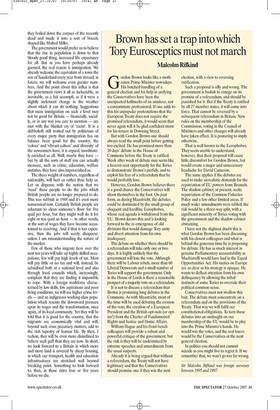Brown has set a trap into which Tory Eurosceptics must not march
Malcolm Rifkind Gordon Brown looks like a motheaten Prime Minister nowadays. His botched handling of a general election and his help in unifying the Conservatives have been the unexpected hallmarks of an amateur, not a consummate professional. If one adds to this his unpopular protestations that the European Treaty does not require the promised referendum, it would seem that never again will it be glad confident morn for his tenure in Downing Street.
But with Gordon Brown one should always read the small print before getting too excited. He has promised more than 20 days' debate in the House of Commons before the Treaty is ratified. Week after week of debate may seem like a heaven-sent opportunity for the Tories to demonstrate Brown's perfidy, and to exploit his fear of a referendum that he would probably lose.
However, Gordon Brown believes there is a good chance the Conservatives will shoot themselves in the foot. On past form, as during Maastricht, the debates could be dominated by the small group of eloquent and hardline Europhobes, whose real agenda is withdrawal from the EU. Brown knows this and is looking forward to the re-emergence of old divisions that would damage Tory unity and divert attention from his own inadequacy.
The debate on whether there should be a referendum will take only one or two days. It is highly unlikely that the government will lose the vote. Although there will be Labour rebels, more than 60 Liberal Democrats and a small number of Tories will support the government. Only in the House of Lords is there a reasonable prospect of a majority vote on a referendum.
It is not to discuss a referendum that Brown is promising long debates in the Commons. As with Maastricht, most of the time will be used debating the erosion of the veto, the creation of a European President and the British opt-outs (or optins!) from the Charter of Fundamental Rights and Justice and Home Affairs.
William Hague and his front-bench colleagues will provide a robust and powerful critique of the government, but the risk is they will be undermined by extreme speeches and amendments from the usual suspects.
Already it is being argued that without a referendum, the Treaty will not have legitimacy and that the Conservatives should promise one if they win the next election, with a view to reversing ratification.
Such a proposal is silly and wrong. The government is foolish to renege on its promise of a referendum, and should be punished for it. But if the Treaty is ratified by all 27 member states, it will come into force. That cannot be reversed by a subsequent referendum in Britain. New rules on the membership of the Commission, voting in the Council of Ministers and other changes will already have taken effect. It is posturing to imply otherwise.
That is well known to the Europhobes. They seem unable to understand, however, that their proposal will cause little discomfort for Gordon Brown, but would create a major and unnecessary headache for David Cameron.
The same applies if the debates are used to make unrealistic demands for the repatriation of EU powers from Brussels. The shadow cabinet, at present, seeks repatriation of the Common Fisheries Policy and a few other limited areas. If much wider amendments were tabled, the risk would be a three-way split, with a significant minority of Tories voting with the government and the shadow cabinet abstaining.
I have not the slightest doubt this is what Gordon Brown has been discussing with his closest colleagues and what is behind the generous time he is proposing for debate. He has as much interest in genuine Parliamentary accountability as Machiavelli would have had in the Equal Opportunities Act. His tactics on Europe are as clear as his strategy is opaque. He wants to deflect attention from his own delinquency by allowing the tribal instincts of some Tories to overrule their political common sense.
Conservatives must not swallow this bait. The debate must concentrate on a referendum and on the provisions of the Treaty. That way we will fulfil our constitutional obligations. To turn these debates into an onslaught on our membership of the EU would be to play into the Prime Minister's hands. He would win the votes, and the real losers would be the Conservatives at the next general election.
In politics you should not commit suicide as you might live to regret it. If we remember that, we won't go too far wrong.
Sir Malcolm Rifkind was foreign secretary between 1995 and 1997.


































































 Previous page
Previous page